- Home
- Jacqueline Wilson
Hetty Feather Page 19
Hetty Feather Read online
Page 19
'Like you, you mean?' I said spitefully.
'You might not think much of my position, Miss High and Mighty, but it suits me perfectly,' said Ida. 'I work hard and I keep respectable and I save my wages.'
'Yes, but what for? You do the same thing day after day, week after week, year after year. You must be mad, Ida. You don't have to stay here. You're not a foundling. You could walk out and get a better job anywhere.'
'I've got a good job here and I was very lucky to get it too, coming from the workhouse,' said Ida. 'You're talking nonsense, Hetty. I know you must be missing Polly sorely but there's no need to take it out on me. I've tried my best to cheer you up.'
'I shall never be cheerful here, never never never,' I declared.
I simply could not stop myself. Ida was my only true friend left in the hospital and yet I seemed determined to alienate her. I stayed rude and sulking all day, doing the barest minimum of work.
'Judging by today, I doubt you can even be a servant when you leave here, Miss Hetty Head-in- the-Air,' Ida sniffed. 'No one in their right mind would ever take you on as a skivvy, let alone a cook. Now, are you going to snap out of it and be a good sweet girl tomorrow?'
I snapped my fingers and then presented her with my own glum face. 'Does it look like it?' I said.
'Well, go away and stew, you stupid girl. I'll pick someone else to come and help me.'
'As if I care,' I said, and marched out of the kitchen.
I cared dreadfully when Ida picked Sheila. I knew she'd done it deliberately to annoy me. Ida didn't like Sheila any more than I did. She just wanted to pay me back. It was bitterly painful to peep through the kitchen hatch and see Ida and Sheila stirring a vat of rice pudding together, laughing away. When Ida saw me looking, she popped a handful of raisins into Sheila's grinning mouth. She gave a little nod, as if to say, That will show you, Hetty Feather.
It showed me all right. It looked as if I'd lost my last friend at the hospital through my own stupid behaviour. I should have gone to Ida privately and apologized, but I was too proud. I stalked around by myself, dutifully keeping an eye on little Eliza but otherwise taking no notice of anyone.
I sat listlessly in the classroom, never bothering to answer a single question now. I felt so dull and slow I could scarcely lift my pen to write any words. I found my grades slipping. I had been first equal with Polly at everything, but now I was sliding down almost to the bottom of the class, along with Mad Jenny and Slow Freda and Stutter Mary, the three sad girls who could barely read and write.
I tried even less with my household tasks. Every Sunday I daydreamed in chapel and ate my dinner stony-faced, staring down all the chattering ladies and gentlemen. There seemed no point in smiling. They would never pick me to be their new little adopted daughter. I was small, sour, red-haired Hetty Feather.
I could not even get interested when everyone started talking about the Queen's Golden Jubilee in June. What did I care for our fat little monarch? Miss Morley's lessons became very focused on the Royal Personage. At long last she used the coloured maps on the classroom wall, showing us all the different lands the Queen ruled over.
When she told us the Queen was also Empress of India, half the class assumed she lived in that huge hot sub-continent. Miss Morley laughed at such ignorance. She said the Queen mostly lived here in London, at Buckingham Palace – and she would quite definitely be in London on 23 June, the day of the Golden Jubilee.
Miss Morley seemed utterly obsessed with Queen Victoria. She gave us dictation about our Loyal Sovereign, she told us the history of her fifty-year reign, she even had us calculating how many seconds would tick by during the Royal Procession if it started at eleven and ended at two. I assumed this was a specific obsession peculiar to Miss Morley – but it seemed to be shared by all the staff. Even little Eliza started babbling about our Great Queen and showed me a picture that she'd drawn in the infant class. I admired it wearily, though her Queen Victoria looked very like a fat stag beetle with a crown upon its head.
We even prayed for Queen Victoria in chapel on Sunday, which seemed to me a little bizarre. Why should all us foundlings, born in shame and destined to live our lives as servants, pray for such a fabulously rich and fortunate old woman who owned whole continents? She should surely be on her padded knees, praying for God's mercy for us.
At the end of the service Matron Bottomly marched to the front of the chapel and ascended the pulpit, her beaky nose pecking the air. She was smaller than the vicar, so only her head was in view, sticking up comically like a coconut on a shy. I had such an urge to aim my hymn book at her!
'I have a very important announcement to make, children,' she said. 'As you all know, our dear Queen has ruled over us for fifty wonderful years. Next Thursday is the day of the Golden Jubilee, when the whole country will celebrate her glorious reign. We are going to celebrate too! You have all been invited to a festive gathering at Hyde Park in London. You will be given a splendid meal at this venue and join in all kinds of fun and games, and then Her Majesty the Queen herself will come and greet you!'
There was a great 'Ooooh' of excitement and astonishment, though perhaps we were more thrilled at the sound of the splendid meal and the fun and games than the prospect of seeing the Queen.
I was excited too, I could not help it. We were going to escape the dreary hospital for a whole day! Oh glory!
'Settle down now, children. You must be especially well behaved. Any child who is seriously surly or disobedient will not be included in the trip to see the Queen,' said Matron Bottomly – and her ridiculous coconut head turned so that she was looking straight at me.
Oh, I understand you very well, Matron Stinking Bottomly, I thought. It would give you such huge delight to be able to deny me my rights. How it would please you to declare before everyone that Hetty Feather was too wicked to attend the Jubilee Celebrations.
I smiled demurely back at Matron Bottomly. For once in my life I wasn't stupidly going to cut off my nose to spite my face. My behaviour over the next few days was exemplary. I tried hard in lessons on Monday, Tuesday and Wednesday, but not so hard that my knowledge irritated Miss Morley. I meekly wrote down her exact words during dictation. I figured out each silly sum, finding how many days it would take Queen Victoria to sail to India if her mighty ship steamed along at a certain terrific rate of knots. I wrote a neat, unimaginative essay on 'What I should say should I meet Her Majesty the Queen'.
I had myself performing copious curtsies, simpering 'If you please, ma'am,' repeatedly. Miss Morley gave me a big red tick and wrote Excellent at the bottom of my page. She actually wrote Excellant, but I decided not to point this out. I sewed aprons exquisitely, using tiny stitches and turning each corner with a perfectly sewn double hem, as if I was making the finest robes for the Royal Household. I dusted every corridor and corner of the hospital, my feather duster reaching up to the picture rails and down to the wainscoting. I practically lined up every infant foundling and gave them a good dusting too.
Oh, how irritated Matron Bottomly must have been when Thursday morning dawned bright and sunny, and there I was, smiling, as good as gold. She was probably tempted to give me a slap for sheer cussedness. She did not have the imagination to invent some wicked misdemeanour on the spot. She simply gave me a hard poke in the back and said, 'Mind your manners while you're out, Hetty Feather. All of London will be looking at us.'
We were all issued with clean clothes from top to bottom that Thursday, breaking with all known custom. Our caps and aprons and tippets were laundered and starched so snowy white they looked brand new. Matron had had every big girl ironing all day Wednesday, when we'd all shuffled round in our stockinged feet while every big boy polished our boots. We were given bread and butter for our breakfast because the nurses were so fearful the little ones might spill their porridge down their crisp white chests. Every child had mouth and hands dabbed at with a damp cloth after breakfast, and all the infants were forced into the privies and frightened into c
opious evacuation so that none would disgrace the hospital during our long outing.
We were lined up in the playground like a miniature brown army, boys one side, girls the other, in serried ranks of six, from the littlest five-year-old fresh from foster care to the biggest, blowsiest girls about to leave to go into service.
Matron Peters positioned herself at the front with the infants, Matron Bottomly brought up the rear with the big ones, while all the nurses and teachers patrolled up and down the lines.
'Right! Let us all step out and look lively. Remember, the entire reputation of the Foundling Hospital rests on you,' Matron Bottomly bawled.
We set off at a quick march – one two, one two, one two. It felt so extraordinary to go out of those iron gates and walk down the road. The very air smelled different, so clean and fresh and invigorating.
London would have looked wondrous to us in a thick fog, but this sparkling, sunny June morning made every great grey building gleam palatially. Every window ledge was decked with bunting, every lamppost embellished with bouquets, every flag flapping in the light breeze. We were told not to break step or loiter even for a second, though I craned my neck and stared when we were marched along Oxford Street, marvelling at the vast emporiums, their windows a wonder of patriotic red, white and blue decoration.
I couldn't get used to the crowds – such huge numbers of people, all shouting, laughing, screaming. Some of our little children started crying in sheer shock, and even I felt frightened, especially when we had to cross a vast road. There were policemen who held up the traffic for us, but they were only puny men. I did not see how they could control so many cabs and carriages and enormous omnibuses. But somehow we all crossed safely, hanging onto each other, our palms sweating.
It was a long, long walk and the little ones in front started dragging their feet and limping in their hard boots, but our spirits picked up as we passed the great Marble Arch and entered the park.
There were ten enormous marquees and many other smaller tents as far as you could see. There were merry-go-rounds and helter-skelters and whirling chairs and swingboats. Children ran around freely everywhere, climbing on the painted horses, sliding down the helter-skelter, squealing with fearful joy in the chairs and boats high above our heads. There were thousands and thousands of children, from tiny tots in pinafores to great girls and boys much taller than me. They were all wearing such wonderful clothes! Many of the girls were dressed in white or soft flower colours, bluebell, primrose, lilac or pale rose-pink, skipping around in soft shoes. The boys wore jolly blue and white sailor suits with jaunty straw hats. They stared at all of us in our ugly brown frocks and breeches, our silly caps and aprons, our red-robin waistcoats and cumbersome jackets, our stiff stout boots. Some openly pointed and commented:
'Look, look, it's the children from the institution!'
'Are they all orphans from the workhouse?'
'No, no, they're foundlings from the hospital. Don't they look quaint!'
We stared back, still in our marching rows, red in the face from the heat and our humiliation. But then Matron Bottomly addressed us through a megaphone.
'This is a message for the senior school! You are allowed to play in the fairground for an hour, so long as you stay within close proximity. All the rides are free. But everyone must report back to marquee number ten at one o'clock sharp for our festive luncheon. Do you all understand?'
We gazed at her, barely able to take it in. Did she really mean we were free to roam as we wished? A few of the big boys made a dash for it before she could change her mind, but a lot of us wavered uncertainly. We were so used to having every minute accounted for. We did not know how to cope with an hour of freedom.
Well, I could cope. I ran to the merry-go-round, circling it twice to select the finest horse. They all had names painted on their arched necks. I looked in vain for a Hetty, but I did find a Polly, a black- and-white stead with a red saddle. I had to lift my skirts in an unladylike fashion to clamber onto her, but I didn't care. Some of the girl riders were sitting demurely sidesaddle, but that looked so silly and lopsided. I had ridden bareback with Madame Adeline. I knew what I was doing.
The organ music struck up and the merry- go-round started turning. I clasped the gold rail and urged Polly forward. We went round and round until all the children blurred and the great green park seemed to be spinning on its axis like a giant globe.
As I stepped off dizzily, I spotted Eliza looking a little dazed amongst a cluster of infants. They were being shepherded around by dear Nurse Winnie. I dashed over to her.
'Can I take Eliza on the merry-go-round, Nurse Winterson? I promise I'll look after her most carefully,' I said.
'Yes, of course you can, Hetty,' she said. She looked longingly at it. 'For two pins I'd have a ride myself!'
I lifted Eliza onto a black horse with a white patch on his face. He was called Star. 'You shall be a little star, Eliza,' I told her.
I thought she would be in ecstasy, but she shrieked when the merry-go-round started going faster.
'Don't like it, don't like it!' she cried, squirming around. 'Let me get off, Hetty!'
'You can't get off, silly, you've only just got on. Don't be scared, Eliza, it's lovely.'
'No it's not!' Eliza said, shutting her eyes tight and clinging to me like a little monkey.
When at last the merry-go-round slowed down, Eliza shot off to Nurse Winterson without a backward glance. I shrugged my shoulders, telling myself I was glad to be free of her. I saw my other sister, Martha, near the helter-skelter and I went rushing over to her, worried that she'd fall trying to get up the steep steps inside. However, she had her two friends, Elizabeth and Marjorie, with her, and they elbowed me out of the way impatiently.
'Martha's got us, Hetty,' said Elizabeth.
'She doesn't need you to help her. She says you fuss far too much,' said Marjorie.
Martha herself simply smiled at all of us, blinking behind her thick glasses.
'Very well, suit yourselves. That's perfectly fine with me,' I said, sticking my nose in the air. I pretended to recognize someone in the great crowd and waved heartily. 'There's my friend! I must go,' I said, running off.
I ran and ran, circling round all the fairground rides, not quite sure which to select. It felt so odd being all by myself when everyone else seemed to be surrounded by friends.
'Oh, Polly, if only you were here,' I whispered.
I knuckled my eyes because they were unaccountably wet – and then opened them wide, because right in front of me was a tall dark boy in foundling uniform, nodding at me shyly.
'Gideon!' I said.
'I came looking for you, Hetty,' he said.
I was overwhelmed that he had taken the trouble to seek me out. In the past I had always been the one to run after him.
'How are you, Gideon?'
'I suppose I am very well,' he said solemnly. He spoke perfectly clearly and coherently, but with a hesitant, mannered air, as if he rarely opened his mouth.
'Oh, Gideon, do you hate it at the hospital too?' I asked, clutching his arm.
He blinked in alarm at my forward gesture, but nodded at me. 'I dislike it very much, but I dread leaving it too. I do not want to be a soldier.'
'It's much, much better than being a servant, you silly boy! Think of the excitement and foreign lands and great battles!'
'Think of the fear and the blood and the hardship,' said Gideon, shuddering. 'I dream about it sometimes. I know I will not be able to bear it. I do not want to live my days in barracks and army camps. The other boys torment me here, but I'm sure it will be far worse living amongst men.'
'Then let us run away together, Gideon, and escape our fate!'
'You're still dreaming, Hetty. Don't tell me you're still planning to run back home to live with Jem so that he can take care of you!'
'No,' I said shortly. 'Not now. I will make my own way.'
'Well, that is good,' he said, clearly humouring me.
&nbs
p; 'We will make our way together. We are still special sister and brother,' I declared. I spun him round and then focused on the fair. 'Oh, Gideon, come on the swingboats with me!'
'They're swinging so rapidly. I think I shall be sick,' said Gideon, but he came with me obligingly.
We crouched on either side of the boat, tugging hard on the ropes so that we swung up and then sharply down, as if we were riding a stormy sea. I pictured the waves and the screaming seagulls and the wild wind as we tossed our way over the ocean to a distant promised land, gabbling this breathlessly to Gideon while he laughed at me.
'You're still the same old Hetty,' he said. 'Oh, stop pulling so – we're going too high!'
'Let's go higher and higher and higher!' I said, tugging with all my might.
Gideon groaned and shut his eyes as the whole park heaved this way and that beneath us, but I stared out, seeing right over the huge marquees and the milling throng of children. Way over to the south of the park, beside the silver stream of the Serpentine, I saw another big striped tent, a cluster of wagons – and a great grey creature with a long waving trunk.
'Oh my Lord! It's Elijah! It's the circus! Oh, Gideon, stop pulling, we must slow down.'
'Don't fret, I want to slow down,' said Gideon weakly, his face greenish-white.
'It's so wonderful! The circus!' I babbled, clutching the edges of the swingboat to try to make it stop.
'Hetty, you'll tip us both out,' Gideon groaned.
'Oh, stop your moaning, boy! Come on, we can jump out now. Wheee!' I made a leap for the ground and landed lightly. Gideon jumped after me and landed on his hands and knees.
'Ouch! Oh goodness, have I torn my breeches?'
'Of course you haven't,' I lied, pulling him up by the hands. 'Come on, Gideon. I'm going to the circus, and this time I'm taking you with me!'

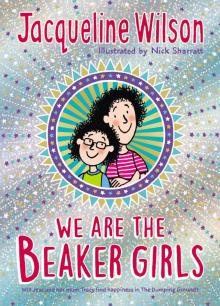 We Are the Beaker Girls
We Are the Beaker Girls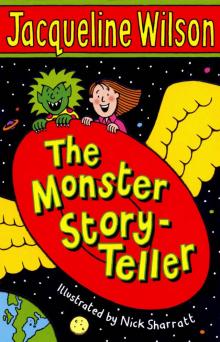 The Monster Story-Teller
The Monster Story-Teller The Worry Website
The Worry Website Girls Under Pressure
Girls Under Pressure Little Darlings
Little Darlings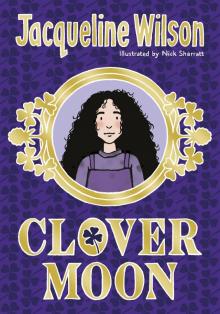 Clover Moon
Clover Moon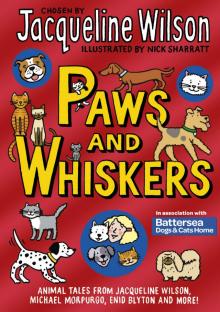 Paws and Whiskers
Paws and Whiskers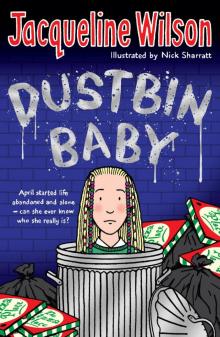 Dustbin Baby
Dustbin Baby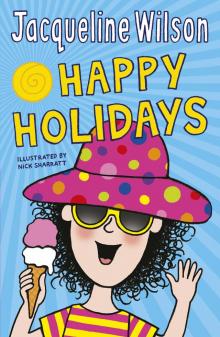 Jacqueline Wilson's Happy Holidays
Jacqueline Wilson's Happy Holidays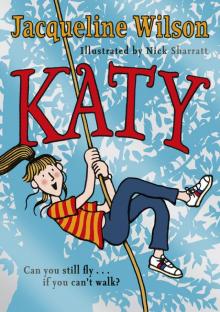 Katy
Katy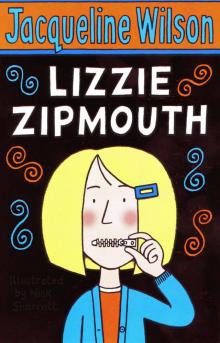 Lizzie Zipmouth
Lizzie Zipmouth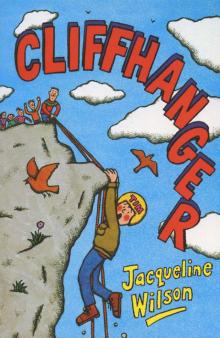 Cliffhanger
Cliffhanger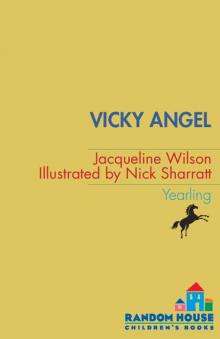 Vicky Angel
Vicky Angel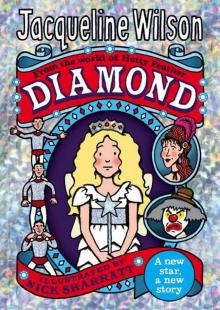 Diamond
Diamond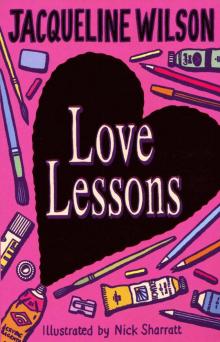 Love Lessons
Love Lessons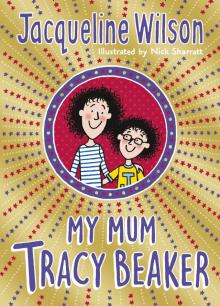 My Mum Tracy Beaker
My Mum Tracy Beaker Lola Rose
Lola Rose Jacky Daydream
Jacky Daydream Green Glass Beads
Green Glass Beads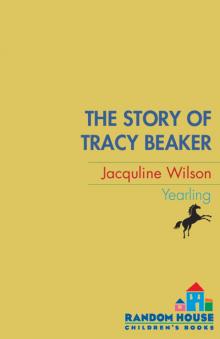 The Story of Tracy Beaker
The Story of Tracy Beaker Clean Break
Clean Break Longest Whale Song
Longest Whale Song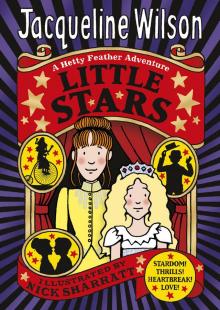 Little Stars
Little Stars Double Act
Double Act The Suitcase Kid
The Suitcase Kid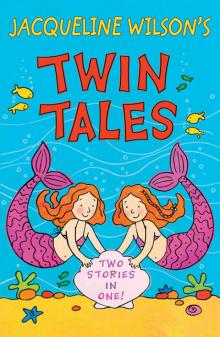 Twin Tales
Twin Tales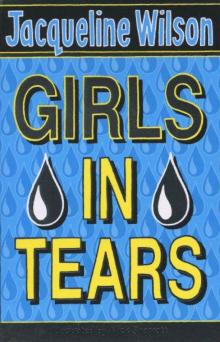 Girls in Tears
Girls in Tears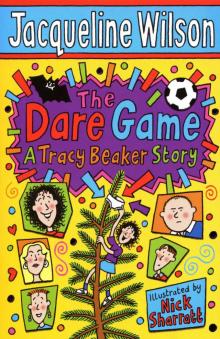 The Dare Game
The Dare Game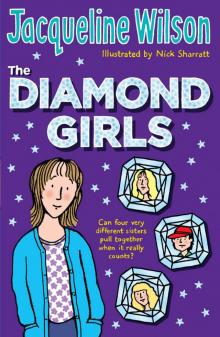 Diamond Girls
Diamond Girls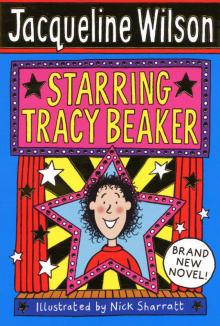 Starring Tracy Beaker
Starring Tracy Beaker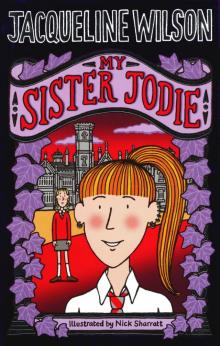 My Sister Jodie
My Sister Jodie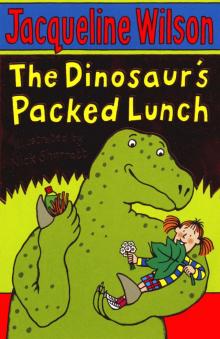 The Dinosaur's Packed Lunch
The Dinosaur's Packed Lunch Candyfloss
Candyfloss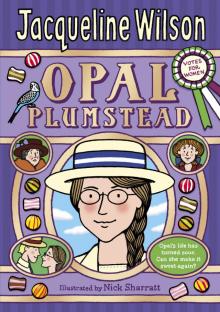 Opal Plumstead
Opal Plumstead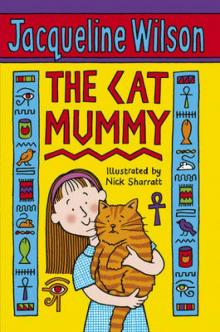 The Cat Mummy
The Cat Mummy Werepuppy and the Werepuppy on Holiday
Werepuppy and the Werepuppy on Holiday Hetty Feather
Hetty Feather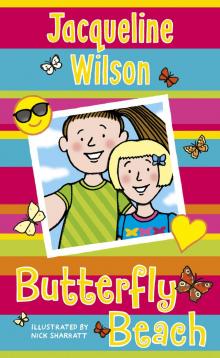 Butterfly Beach
Butterfly Beach Midnight
Midnight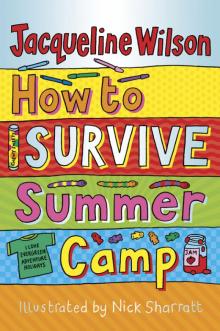 How To Survive Summer Camp (ePub)
How To Survive Summer Camp (ePub) Cookie
Cookie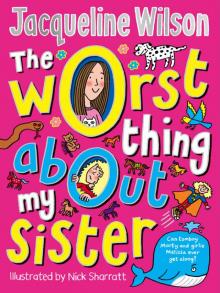 The Worst Thing About My Sister
The Worst Thing About My Sister Bad Girls
Bad Girls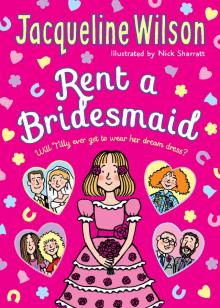 Rent a Bridesmaid
Rent a Bridesmaid Girls in Love
Girls in Love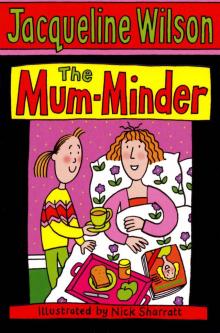 The Mum-Minder
The Mum-Minder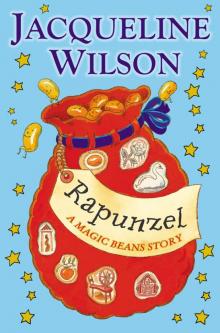 Rapunzel
Rapunzel Lottie Project
Lottie Project Best Friends
Best Friends Video Rose and Mark Spark
Video Rose and Mark Spark Glubbslyme
Glubbslyme Girls Out Late
Girls Out Late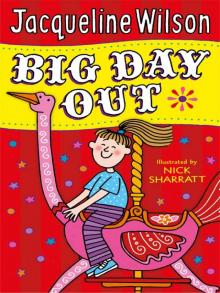 Big Day Out
Big Day Out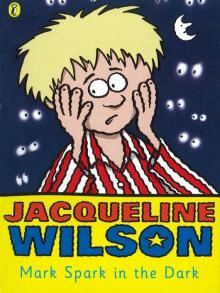 Mark Spark in the Dark
Mark Spark in the Dark Buried Alive!
Buried Alive! Four Children and It
Four Children and It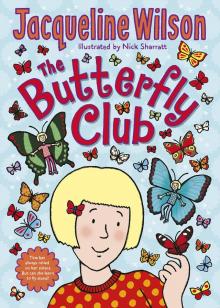 The Butterfly Club
The Butterfly Club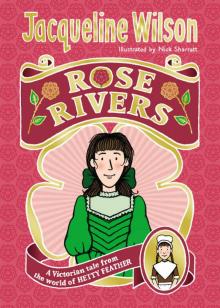 Rose Rivers
Rose Rivers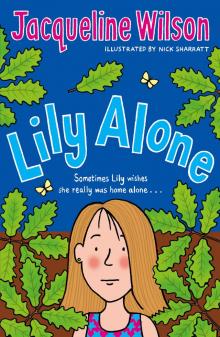 Lily Alone
Lily Alone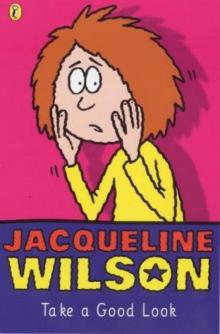 Take a Good Look
Take a Good Look My Secret Diary
My Secret Diary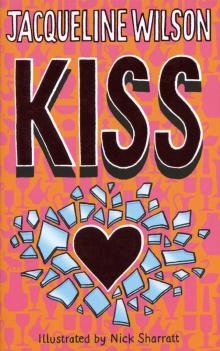 Kiss
Kiss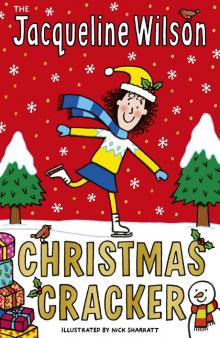 The Jacqueline Wilson Christmas Cracker
The Jacqueline Wilson Christmas Cracker The Worry Web Site
The Worry Web Site Emerald Star (Hetty Feather)
Emerald Star (Hetty Feather) The Bed and Breakfast Star
The Bed and Breakfast Star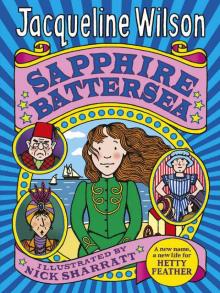 Sapphire Battersea
Sapphire Battersea Cat Mummy
Cat Mummy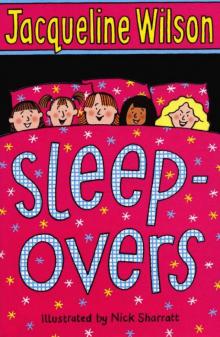 Sleepovers
Sleepovers Dare Game
Dare Game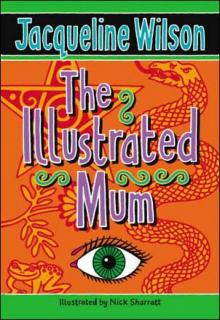 The Illustrated Mum
The Illustrated Mum Secrets
Secrets